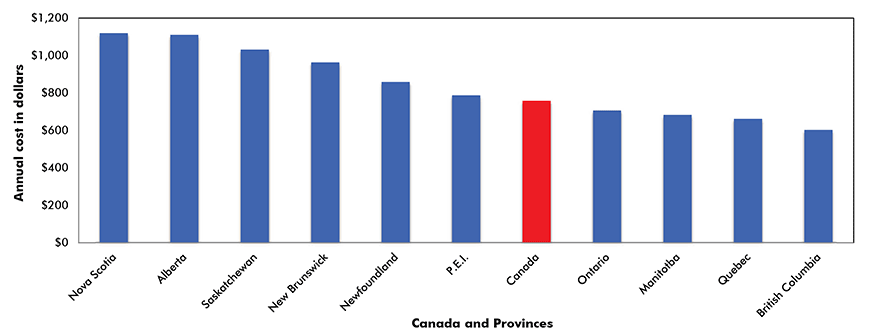In our Snapshot titled “Sustained global growth and a buoyant U.S. economy bode well for Canada”, we noted that the Organization for Economic Co-operation and Development (OECD)’s Economic Survey concluded that “economic growth (in Canada) remains buoyant,” a view reinforced by the latest above-consensus gain in May GDP.
While the OECD’s overall short-term outlook for Canada is quite positive, it highlights a number of serious risks. First, the OECD expressed the view (shared by others including ourselves) that uncertainty about global trade in general and about Canada’s trade prospects posed a significant risk to the economy’s near term health. Second, highly leveraged first-time home buyers are vulnerable to the impact of the higher interest rates.
A third significant concern expressed by the OECD is the relative deterioration in Canada’s competitive position vis-à-vis the United States, our major foreign market, following that country’s significant (14 point) reduction in its corporate tax rate, plus 100% ‘bonus’ depreciation rate for capital equipment expenditures.
Recently, the Minister of Finance, Bill Morneau, acknowledged that Canada does have a competitiveness problem and indicated he wants to encourage business investment and will announce some measures to do so in the fall fiscal update. Unfortunately, he is not interested in reducing either personal income tax rates, with top rates that average 52%, approximately 8% above top rates in the U.S., nor in lowering corporate taxes which at close to 27% are among the highest among the 33 countries in the OECD.
Both Mr. Moreau and the OECD seem to have overlooked the additional direct and indirect impact of the federal government’s proposed carbon tax on corporations and on individuals. In a document titled Estimated Results of the Federal Carbon Pollution Pricing System, the federal government states that “pricing carbon reduces pollution at the lowest cost to business and consumers”.
Regarding the proposed benefits of its carbon tax, the government states that “a price on carbon could cut carbon pollution across Canada by 80 to 90 million tons” by 2022. During 2017, Canada emitted 560 million tons of CO2, approximately 1.7% of the global total.
If this tax had been put in place at the beginning of this year it would, in four years, have theoretically reduced the country’s total CO2 emissions by 15% and cut global CO2 output by 0.3%. However, despite this slight reduction, global greenhouse gas emissions are projected to steadily increase by 10 to 15 billion tons (many times Canada’s total CO emissions) over the next 22 years, largely due to projected growth of emissions by less developed countries outside the OECD.
Given the transitory impact of carbon tax on our total CO2 emissions, what about the costs which, unless the tax is subject to a sunset clause, will last forever? Remember income tax was supposed to be a temporary tax introduced in 2017 to finance the First World War. First, a recent article by Professor Jennifer Winter at the University of Calgary’s School of Public Policy provides estimates of the cost of carbon taxes on households across Canada’s ten provinces. Professor Winter quantifies both the direct cost of the tax on emission from energy used by households plus the indirect costs resulting from the pass through of costs from businesses to households.
Obviously, the impact of a carbon tax on households across the country will vary dependent on their relative use of the three broad categories of energy use, i.e. electricity, fuel for transportation (gas, diesel) or home heating (electricity, natural gas, oil).
In addition, provincial programs to offset the tax may reduce its severity. Based on Professor Winter’s analysis, the three provinces hit hardest by the tax, Nova Scotia, Alberta and Saskatchewan, are the most heavily dependent on coal to generate electricity. As the chart illustrates, Quebec and Manitoba — which rely on hydro to generate more than 90% of their electricity — are least impacted.
A comprehensive analysis of the impact of carbon pricing on the economy is presented by the Conference Board of Canada’s The Cost of a Cleaner Future. Regarding the impact of a carbon tax on the economy in general, the Conference Board notes that “the economy will shrink marginally in response to the carbon tax”. Consistent with Professor Winter’s analysis, the Board states that “higher prices weaken real household income and spending and trade volumes are lower.” The hardest hit industries in these scenarios were residential construction and the finance, insurance and real estate sector.
This report was written just ahead of the recent announcement by Environment Minister, Catherine McKenna, of the federal government’s plan to try and ease the impact of the carbon tax on big companies facing high competitive risks.
Estimated annual cost of federal carbon tax on a typical Canadian household by province*

Chart: ConstructConnect — CanaData.











Recent Comments
comments for this post are closed